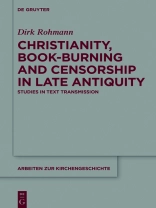It is estimated that only a small fraction, less than 1 per cent, of ancient literature has survived to the present day. The role of Christian authorities in the active suppression and destruction of books in Late Antiquity has received surprisingly little sustained consideration by academics. In an approach that presents evidence for the role played by Christian institutions, writers and saints, this book analyses a broad range of literary and legal sources, some of which have hitherto been little studied. Paying special attention to the problem of which genres and book types were likely to be targeted, the author argues that in addition to heretical, magical, astrological and anti-Christian books, other less obviously subversive categories of literature were also vulnerable to destruction, censorship or suppression through prohibition of the copying of manuscripts. These include texts from materialistic philosophical traditions, texts which were to become the basis for modern philosophy and science. This book examines how Christian authorities, theologians and ideologues suppressed ancient texts and associated ideas at a time of fundamental transformation in the late classical world.
เกี่ยวกับผู้แต่ง
Dirk Rohmann, Universität Sheffield, Sheffield, Großbritannien.












